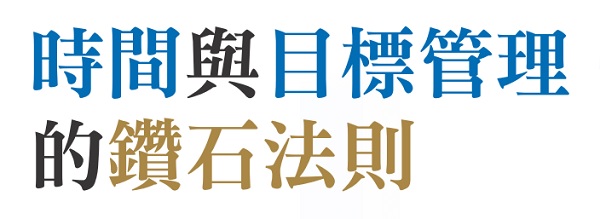The Diamond Rule of Time and Goal Management

French entomologist Jean-Henri Casimir Fabre in the 19th century once conducted an experiment. When pine processionary caterpillars travel through trees, they line up head to tail in a long line, each following the leader. Fabre arranged several caterpillars along the edge of a large round flower pot to form a ring of caterpillars with no beginning or end. He also placed some food six inches away from the flower pot to observe whether the caterpillars would move for food. Disband the team and stop advancing. As a result, the caterpillar crawled along the edge of the basin for 7 days and 7 nights, until it died of starvation and exhaustion, unaware that food was close at hand.
This experiment reminds us that a person who has no goals in life and just blindly follows the crowd may be like this kind of caterpillar and not want to change, wasting a life that should be rich in mediocrity.

▲The Danish existentialist philosopher Kierkegaard once said: "What I really lack is knowing in my heart what to do."
Danish existentialist philosopher Søren Aabye Kierkegaard once said: "What I really lack is an inner knowing of what to do."
Indeed, the instinctive caterpillar cannot understand Kierkegaard's emotion about the pursuit of life. However, as Christians, how should we live out the abundant life given to us by the Lord Jesus? If you learn "time management" but don't know "what to do", you will still run without direction; if you know "what to do" and start "goal management", if you cannot make good use of time, you will achieve nothing. Put time and goal management on the life path map, use the inspiration of the Bible to conduct self-examination with the "Diamond Rule", and hope to practice wisdom and achieve your life goals.

▲A life without goals is just blindly following the crowd, mediocre and wasting what should be a rich life.
Diamond Time:
D = 目標與方向:打破時鐘、看見羅盤(Destination and Direction)
A = 高度:更高的目的,計畫中有神(Altitude)
N = 引導:掌握順序,拒絕忙碌誘惑(Navigation)
M = 早晨:善用早晨,向主敞開(Morning)Notes
T = 歲時與恆時:有限時間,活出永恆意義(Time)
1. Goals and directions
Time management master Stephen Covey said in the best-selling book "A Date with Time" (Stephen Covey, First Things First): "How fast you go is one thing, the direction is the most important." The goal determines the direction, but the direction is wrong. , and will never reach the destination. Covey breaks the myth that "time management" means "racing against time". The basis of traditional time management is the "clock", and he proposed the concept of "compass". The clock is a symbol of efficiency, and the "compass" is the place of value and direction.
2. Higher Purpose
But who can determine the compass of life? People are rational and find it difficult to give themselves a mission that transcends themselves and are willing to undertake. They always try to find happiness in self-fulfillment. At best, they are just "prisoners imprisoned on the island of their own thoughts." (Quotation from Shakespeare's play "The Tempest" Princess Miranda) lives for work, money, family, relationships, and a "self" that often surrenders to the flesh.
Jesus said, “Seek first the kingdom of God and his righteousness, and all these things will be added to you” (see Matthew 6:33). This is the heavenly height of the Christian.
When people are willing to go through fire and water for a mission that is higher than their own wishes, they will assume a "higher purpose" than life. The completion of life is not just the immediate success, and the end of life is not the end of meaning.
Moses lamented that the short life was just labor and sorrow, and it was all gone in a blink of an eye. He also prayed to God on behalf of the world: "Teach us how to number our days, so that we may gain a heart of wisdom." (Psalm 90:12) Yes! Even though life is so short, ask God to help us understand His plan for our lives. If you know the Lord of your life plan, seek His presence, and live with the mentality of knowing the outcome of this life in the hope of eternal life, you can live infinitely amidst objective limitation.
If you have God in your life plan, you won’t have to worry about gains and losses. You will know how to be humble, rich, rich, and lacking. Know that God is the provider, and that every good gift and perfect reward comes from above. There is no change or shadow of turning in Him. Mastering this height is like going out every morning, no matter it is cloudy or sunny, knowing that the sun will still rise.
3. Master the sequence
"No time" is probably the most common complaint when reviewing time management. Randy Pausch, the author of "The Last Lecture", immediately pointed out: "Having no time actually means not setting priorities. In fact, time management is a process in our psychology. work on setting priorities for reform.”
God’s word says this: “Take heed, not as fools, but as wise. Make the most of the time, for the days are evil. Do not be foolish, but know what the will of the Lord is.” (Ephesians 5) :15-17)

▲Mastering the sequence is the key point of time management.
(1) First things first
In the aforementioned work, Covey distinguished four quadrants based on the "importance" and "urgency" intensity of things, explaining the time management principle of "first things first". Most of the things that consume the most time are "urgent and important" and "urgent but not important"; but when inadvertently, it is easy to waste time on trivial things that are "neither urgent nor important".
He emphasized that goals related to personal or organizational growth often fall into the "not urgent but important" category and appear in mid- and long-term plans. If you don't learn to set priorities, you will habitually deal with "urgent" things first (no matter how important or not). At the end of a day or a week, you will find that most and main time is spent here, and the remaining fragments are simply not enough ( or have no intention) to carry out "not urgent but important" mid- to long-term plans.
"Urgent and important" matters are related to the operation or survival of the organization and must be handled promptly and appropriately. Individuals and organizations must prioritize "not urgent but important" innovation work and medium- and long-term projects, and continue to promote them on a weekly basis. Only in this way can important goals be clearly transformed into priority execution items on the calendar.
(2) Say no to inefficiency
After setting our priorities, we must say "no" to things that make us busy and unproductive and ineffective. It’s a small trick, but as Aristotle said: “Repeated actions make us what we are.”
Develop efficient processing skills, including: writing down to-do items in notes (or writing them down in your mobile calendar); saying “no” to things that are not within your scope of authority and cannot be done; developing the idea that “things have their place, The discipline of "everything has its own rules and everyone has its own responsibilities"; avoid consecutive tight meetings in the office; use half-hour (or appropriate) intervals to adjust your attention and deal with emergencies.
If these habits can be sustained, they will have the amazing effect of accumulating sand into a tower. The purpose is to find high-quality time to deal with important and difficult things and maintain the principle of "first things first".
(3) Is being “busy” just to avoid important things?
Mediocre people are poor at setting priorities and lack focus. In other words, they fail to grasp the key points, but like the feeling of being busy. The calendars are often just trivial matters that have no major purpose. Mediocre managers most often put aside mid- to long-term planning and focus on less important but seemingly urgent tasks first. They are afraid of not being busy, because not being busy will show a lack of ability.
People who work smart know to put first things first and focus on results, because being busy does not mean being diligent. Instead of just showing off as busy, or bragging about how many meetings you have attended and how many activities you have organized, you should ignore the real benefits and impact of meetings and activities.
Leaders need to be able to lead teams with enthusiasm, face goals bravely, understand priorities, and stay focused. Only the former without the latter is like a person who knows what to do but cannot concentrate resources, resulting in accomplishing nothing. On the contrary, if you have focus but no priorities, you may be efficient in doing things, but you cannot see the progress that the organization needs. Only by taking both into consideration can leaders lead their teams to fight hard. The clearer your goals are, the better your priorities will be.
4. Make good use of morning
(1) Make good use of the morning and prepare your mind
As the old saying goes, the day's plan begins in the morning. Pastor Rick Warren, known as one of the most influential spiritual leaders in the United States, emphasizes the importance of morning in Christian practice and spirituality. He suggested that to spend time with God meaningfully, you must first start with a suitable attitude, and secondly, choose a specific period of time to give God the best time of the day. He said that for many people, early morning is the best time - when they feel refreshed and respond best. The Lord Jesus’ method was to get up early in the morning to pray and see the Father alone. (Refer to Mark 1:35)
In the Bible, Job offered sacrifices in the early morning, and David asked to hear God's loving words in the early morning. These are all encouragements for Christians to get closer to God. Missionary Hudson Taylor once said, don’t hold a concert first and tune the music later; start every day with God’s word and prayer, and put a harmonious relationship with God first. At the end of the 19th century, the great revival that arose among British college students began with "remember the morning watch." The morning watch is to turn your heart and mind to the Lord Jesus at the beginning of the day.

▲Make good use of the morning and stand on a spacious ground.
(2) Make good use of the morning and stand on a spacious place
Christian office workers go out early and arrive at the office early to avoid the crowds and traffic. The air is fresh and there is less rush and irritability. They do not need to constantly greet people and will not be disturbed by phone calls. Use this time to read the Bible, do spiritual practice, and then go directly to work according to the goals and to-do items set the day before, and complete the things that must be prioritized during the day. Whether going to work or attending an event, those who leave early usually have the opportunity to arrive earlier, while those who leave late may arrive later than expected, because the former enjoys exclusive freedom of time and space, while the latter must compete with participants for limited resources. . Make the most of your morning time and “let our feet stand in the broad place.” (See Psalm 31:8)
Many scriptures encourage Christians to meet with God early in the morning. “In the morning, O Lord, you will hear my voice; in the morning I will declare my thoughts to you, and I will keep watch!” (Psalm 5:3) “It is new every morning; great is your faithfulness! ” (Lamentations 3:23) Pray that Christians will enjoy intimate communication with God and receive new love and mercy every morning.
5. Limited time
(1) From age to eternity
The Bible uses two words to talk about time: Chronos (years) and Kiros (eternity). Years refer to general time patterns, such as the time on the clock, the seasons, the physical process of birth, aging, illness, and death, etc. Time is a resource that decreases with age. If you can do more with less time, you will feel happy.
Eternity points to God’s eternal time. The soul created, nourished, and capable of growth by God belongs to the realm of eternity. How to face life or work with a permanent perspective, and accept the joy, enjoyment, learning, and changes in it, will change people's attitude towards time, and then change their arrangement of time.
What is important in one year may have a different priority in eternity. At the same time, because Jesus Christ never changes, yesterday, today, and forever, it also gives stability to the ever-changing life.

(2) Timetable for knowing God
There is a time for everything, and there is a time for everything in the world. The creation of the universe and the rise and fall of all nations are all under God’s control. Since the creation of the world, God has intervened in human history to reveal the path we should take, and God has always fulfilled his eternal purpose according to His timetable. Know God and His timetable, and accept that God is in control of everything from the rise and fall of empires to the small things people ask and think every day. God has the power to part the Red Sea and lead the Israelites out of Egypt, and He also has the tenderness to care for the lilies of the field. Because of God’s integrity and truth, Christians can be confident that God’s kingdom will come and His eternal purpose will be accomplished.
Therefore, learn to be a person after God’s heart in everything. If you look to His power, sovereignty, and kindness, and benefit those who love God, you will be able to obey the Lord and use your time on earth more wisely, thereby obtaining spiritual benefits and bringing eternal impact.
The Lord Jesus is the best example of the Diamond Rule of goal and time management. During His short three-year ministry on earth, He was able to avoid being hasty and have a direction because He clearly recognized the goals entrusted by His Heavenly Father. He met with his Heavenly Father in the morning and did not let the world get in the way of his priorities. He adhered to the plan of atonement for the sins of the world according to the schedule of God the Father, and went to the cross without fear.
We take Jesus Christ as our benchmark, the Diamond Rule as our discipline, and understand the goals entrusted by God. In our limited years, we rely on God’s wisdom to manage time and goals, glorify God and benefit people, and accomplish our eternal mission. .
Note:Here, the order of N first and M last echoes the time management strategy and writing purpose of "mastering the order" first and "making good use of the morning" last.
John Chen, has worked in major cities in the United States for many years, and was baptized at the Wheaton Chinese Mission Church in Chicago in 2008. During my work, I led the team to handle many large-scale activities and carried out organizational management transformation. I believe that nothing is impossible with the Lord when led with love.
